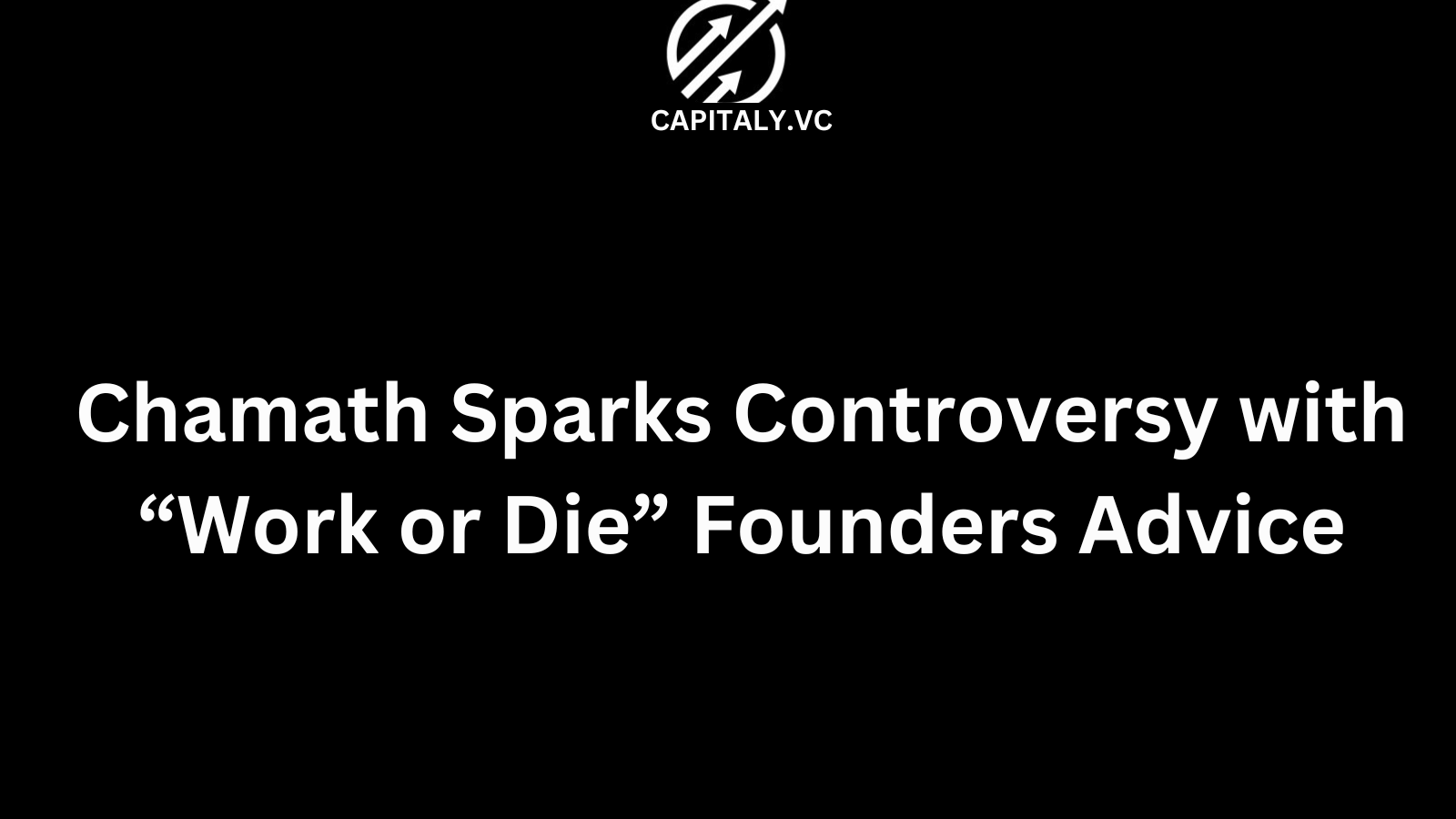Chamath Palihapitiya has done it again.
This time, it’s not a SPAC or a portfolio company or a policy take — it’s a four-word tweet that lit up founder Twitter:
“Work or die. That’s it.”
In this blog, we’ll unpack what Chamath really meant (or didn’t), why founders were divided, and what this says about the state of hustle culture, startup leadership, and capital discipline in 2025.

1. What Did Chamath Actually Say?
It was short, sharp, and predictably polarizing.
Chamath on X:
“Work or die. That’s it.”
No context. No follow-up. Just a classic billionaire drop-the-mic moment.
The quote immediately triggered thousands of reactions — from praise to parody to fury.
2. Why Did This Go Viral?
Because it hit a nerve.
We’re in an era of:
- Work-life balance backlash
- Founders burning out
- Investors demanding more discipline
- Startups being forced to earn capital, not just raise it
The phrase “Work or die” felt like a throwback to 2012 YC energy — and people were not aligned.
3. Founders React: A Civil War on Twitter
Here’s how the community broke down:
Camp 1: “He’s Right.”
- “Startups aren’t for tourists. If you’re not obsessed, get out.”
- “Founders needed this wake-up call.”
- “Chamath built Facebook growth — he knows what it takes.”
Camp 2: “This Is Toxic.”
- “Mental health matters. We’re not robots.”
- “This is exactly the mindset that causes founder suicides.”
- “Capital allocators shouldn’t glamorize suffering.”
4. What Did He Mean Really?
Chamath has always had a brutally simple worldview when it comes to startups:
- Capitalism rewards output
- Startups are survival games
- There are no safety nets at the edge of innovation
“Work or die” wasn’t medical advice.
It was metaphor — the same way people say “build or die,” “ship or shut up,” or “move fast and break things.”
But when it's Chamath, people expect more precision. Or at least, a thread.
5. This Isn’t New — It’s Just Louder Now
Let’s not pretend this is the first time founders were told to sacrifice.
Paul Graham once said:
“Startups are like having your face pushed into the ground while people kick you.”
Elon Musk famously said:
“Running a startup is like eating glass and staring into the abyss.”
Chamath just removed the poetry.
6. What’s the Risk of This Mindset?
The danger isn’t the quote.
The danger is when founders internalize it without nuance:
- Working 18 hours a day = signal
- Burnout = badge of honor
- Sleep deprivation = proof of commitment
That’s not leadership. That’s martyrdom.
And investors don’t fund martyrs. They fund momentum.
7. Why the Timing Matters
This quote didn’t happen in a vacuum.
VCs are tightening up.
Downrounds are everywhere.
Bridge rounds are drying up.
Founders are being told: "Get profitable or get lost."
So when Chamath says “Work or die,” he’s really saying:
“No one’s coming to save you.”
8. Should Founders Still Work Like They’re on Fire?
Sometimes, yes.
But here’s the better rule:
“Don’t outwork. Outlast.”
Building a company is a long game.
The founder who lasts 10 years will beat the one who burns out in 2.
You need obsession.
But you also need oxygen.
9. Chamath’s Playbook Isn’t for Everyone
Chamath was built different.
- Born in Sri Lanka.
- Raised in Canada.
- Built Facebook growth.
- Made billions.
- Took heat. Took wins. Took Ls.
He didn’t get here with balance.
He got here with focus. Cold strategy. And yes — obsession.
But most founders aren’t Chamath. And they don’t need to be.
10. The Capitaly Take: Don’t Die for Your Deck
At Capitaly, we believe in founder stamina over founder sacrifice.
If you’re building a company to last, you need:
- Systems, not sprints
- Health, not heroics
- Support, not solo acts
You want to raise capital?
Great.
Just don’t die for a pitch deck no one will remember in 6 months.
For practical tools, check out:
👉 Fundraising Is a Process, Not a Project
FAQs
1. Did Chamath really say “Work or die”?
Yes. On X. It was a four-word tweet with no context.
2. Was it serious or satirical?
Likely metaphorical, not literal. But the ambiguity triggered intense reactions.
3. Are founders expected to work nonstop?
No. Sustainable founders build better companies. But there are seasons that require intensity.
4. What’s the alternative to hustle culture?
Deliberate culture. Focused execution. Clear outcomes. Systems that scale you, not drain you.
5. Should VCs promote this mindset?
Some do. Some don’t. It depends on the stage, the founder, and the company’s velocity.
6. What if I feel burnt out?
Talk to other founders. Get a coach. Take a pause. Burnout kills startups faster than competition.
7. What’s Chamath’s startup background?
Facebook (growth), Social Capital (VC), multiple SPACs. He’s known for bold opinions and bold bets.
8. Should I follow Chamath’s advice?
Consider it. But filter it through your own context and capacity.
9. Has he clarified the tweet?
Not directly. But his interviews and past comments suggest a ruthless focus on outcomes.
10. What’s a better mantra than “Work or die”?
“Execute or evaporate.”
“Scale without sacrifice.”
Or our favorite: “Raise capital at the speed of AI.”
Conclusion
Chamath’s “Work or die” moment sparked controversy for good reason — it represents the tension between startup idealism and brutal execution.
But here’s what we believe:
Founders don’t need to die to build great companies.
They need to design lives — and systems — that let them win long-term.
Subscribe to Capitaly.vc Substack (https://capitaly.substack.com/) to raise capital at the speed of AI.


.png)